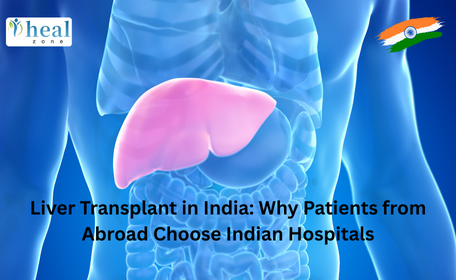Contact us
Liver Transplant in India: Why Patients from Abroad Choose Indian Hospitals
By Dr. Deepanshu Siwach
25 August 2025
- Understanding Liver Transplant
- Why India is Emerging as a Global Leader in Liver Transplants
- The Cost Advantage in Detail
- The Role of Heal Zone in Your Liver Transplant Journey
- Success Stories of International Patients
- Preparing for a Liver Transplant in India
- Challenges International Patients May Face
- Future of Liver Transplants in India
- Conclusion
Liver Transplant in India: Why Patients from Abroad Choose Indian Hospitals
Liver transplantation has revolutionized the treatment of end-stage liver disease and other severe liver conditions. For many patients worldwide, a liver transplant represents the only chance at survival and a return to normal life. Over the past two decades, India has emerged as one of the top destinations for liver transplantation, attracting thousands of international patients every year.
Countries across Africa, the Middle East, South Asia, and even developed nations in Europe and North America are seeing patients travel to India for cost-effective, high-quality, and reliable treatment. With highly skilled surgeons, world-class hospitals, cutting-edge technology, and affordable healthcare costs, India is now a trusted hub for complex medical procedures like liver transplantation.
In this blog, we’ll explore why international patients choose India for liver transplants, the process involved, the success rates, and how a medical tourism facilitator like Heal Zone plays a critical role in making the journey smooth, safe, and stress-free.
Understanding Liver Transplant
Before diving into why India is a leading choice, let’s briefly understand what a liver transplant involves.
A liver transplant is a surgical procedure where a diseased or failing liver is replaced with a healthy liver from a donor. This may be from:
-
Living Donor: A healthy person (often a relative) donates part of their liver, which regenerates naturally in both the donor and recipient.
-
Deceased Donor: The liver comes from a person who has died, with consent for organ donation.
Common Conditions Requiring a Liver Transplant:
- Chronic liver disease and cirrhosis
- Hepatitis B or C infections causing irreversible damage
- Liver cancer (hepatocellular carcinoma)
- Biliary atresia (common in children)
- Alcohol-related end-stage liver disease
- Metabolic diseases (e.g., Wilson’s disease, hemochromatosis)
A successful liver transplant can dramatically improve survival and quality of life, but access and affordability remain challenges in many countries—something India helps bridge.
Why India is Emerging as a Global Leader in Liver Transplants
Expert Surgeons with International Recognition
India has some of the world’s most respected and experienced liver transplant surgeons. Doctors such as Dr. Vivek Vij, Dr. Arvinder Singh Soin, and others have performed thousands of successful transplants and are pioneers in techniques like living donor transplantation and laparoscopic donor hepatectomy.
Many of these specialists have trained and practiced in countries like the USA, UK, or Singapore, bringing global expertise back to India. Their international exposure, combined with India’s high patient volume, means surgeons here develop unmatched experience.
High Success Rates Comparable to the West
The success rate of liver transplants in India is 90–95%, on par with or sometimes exceeding outcomes in Western countries. Living donor liver transplants in India, in particular, have seen remarkable success due to meticulous pre-surgical evaluation, surgical precision, and robust post-operative care.
Cost-Effective Treatment
One of the biggest reasons international patients choose India is affordability.
-
In the USA or UK, a liver transplant can cost USD 300,000–600,000.
-
In India, the same procedure costs USD 30,000–60,000 depending on hospital, city, and patient condition.
This cost difference, combined with world-class quality, makes India an attractive option for patients from countries where treatment is either unavailable or unaffordable.
Advanced Infrastructure & Technology
Indian hospitals are equipped with:
- Dedicated liver ICUs with advanced monitoring
- Robotic and laparoscopic surgery capabilities
- Cutting-edge imaging (3D CT, MRCP, etc.)
- Internationally accredited labs and diagnostic facilities
Top hospitals like Medanta, Apollo, Fortis, Max Healthcare, and BLK have specialized liver transplant units that are NABH- and JCI-accredited, ensuring global standards of safety and quality.
Living Donor Expertise
India has become a global leader in living donor liver transplantation (LDLT). Since cadaveric donations are limited, Indian surgeons have pioneered techniques that maximize donor safety and optimize outcomes.
Innovations like pure laparoscopic donor hepatectomy make the process minimally invasive for donors, reducing recovery time and complications. This expertise is a big attraction for patients abroad who may not have access to living donor transplants in their home countries.
Comprehensive Post-Transplant Care
Post-operative care is just as important as the surgery itself. Indian hospitals provide:
- Strict infection control protocols
- Advanced immunosuppressive therapies
- Long-term dietary and lifestyle guidance
- Regular monitoring and follow-up care
International patients benefit from well-structured post-transplant programs that ensure recovery and long-term survival.
Cultural & Language Comfort
India’s cultural diversity makes it easier for patients from South Asia, the Middle East, and Africa to feel at home. Many hospitals have Bengali, Arabic, French, and Russian translators, and facilitators like Heal Zone ensure patients and families communicate smoothly with doctors.
The Cost Advantage in Detail
To give you a clearer picture, here’s an approximate cost comparison:
| Country | Average Cost of Liver Transplant |
|---|---|
| USA | USD 300,000–600,000 |
| UK | USD 250,000–400,000 |
| Singapore | USD 200,000–250,000 |
| Turkey | USD 100,000–150,000 |
| India | USD 30,000–60,000 |
Even after factoring in travel, accommodation, and attendant expenses, patients still save significantly by choosing India.
The Role of Heal Zone in Your Liver Transplant Journey
For international patients, navigating a complex medical journey in a foreign country can feel overwhelming. This is where Heal Zone, a trusted medical tourism facilitator, comes in.
How Heal Zone Helps:
- Medical Visa Assistance – complete guidance on documents, application, and extensions
- Hospital Coordination – connecting patients with India’s top liver transplant surgeons and arranging hospital invitations
- Travel & Stay Support – from airport pickups to hotel or guesthouse bookings
- Attendant Facilitation – visa and logistical support for up to two attendants
- Translation & Cultural Support – Bengali-speaking support staff for Bangladeshi patients, plus multi-language help for others
- Registration & Legal Support – FRRO registration in India, plus help with organ transplant clearance when required
- 24/7 Patient Assistance – round-the-clock support during treatment and recovery
With Heal Zone by your side, patients and families can focus on healing while the company handles the logistics.
Success Stories of International Patients
Thousands of patients from Bangladesh, Iraq, Afghanistan, Nigeria, Kenya, and the Middle East have successfully undergone liver transplants in India. Many testify not only to the medical excellence but also the compassionate care they received.
For instance:
- A Bangladeshi child with biliary atresia received a life-saving transplant at Apollo Hospitals, with donor support facilitated through Heal Zone.
- An Iraqi patient suffering from hepatitis-related cirrhosis underwent a successful transplant at Medanta, supported by end-to-end coordination through Heal Zone.
Such real-world success stories inspire confidence among new patients considering India.
Preparing for a Liver Transplant in India
Here’s what international patients need to keep in mind:
- Medical Reports – Carry detailed reports from your home doctor.
- Hospital Invitation – Required for visa approval.
- Medical Visa – Apply through the Indian embassy or via e-Medical visa portal.
- Financial Proof – Bank statements or solvency certificate.
- Attendant Support – Up to 2 attendants can accompany the patient.
- Post-Care Commitment – Be prepared for follow-ups and lifestyle adjustments.
Heal Zone simplifies all these steps, ensuring nothing is missed.
Challenges International Patients May Face
While India is a global leader, patients must be prepared for challenges like:
- Visa delays due to documentation issues
- Cultural differences and communication barriers
- Managing post-operative care in a new country
With an experienced facilitator like Heal Zone, these challenges are minimized, as they offer end-to-end support tailored for international patients.
Future of Liver Transplants in India
India is investing heavily in research and innovation:
- Stem cell and regenerative medicine for liver repair
- Robotic-assisted surgeries for greater precision
- Increasing awareness of cadaveric donation programs
With these advancements, India’s role as a global hub for liver transplants will only strengthen.
Conclusion
Liver transplantation is one of the most complex yet life-saving procedures in modern medicine. For international patients, India offers the perfect blend of medical excellence, affordability, and compassionate care.
With world-class surgeons, high success rates, advanced infrastructure, and cost-effective treatment, India continues to attract thousands of patients seeking a second chance at life.
By choosing a reliable facilitator like Heal Zone, patients can eliminate the stress of navigating visas, hospital coordination, travel, and follow-ups. Heal Zone ensures that the entire journey—from initial consultation to recovery—is smooth, safe, and focused on healing.
If you or a loved one is considering a liver transplant abroad, India should be at the top of your list—and Heal Zone will be your trusted partner every step of the way.
Contact us
Written by
Doctor of Pharmacy (PharmD)
Frequently Asked Questions
The cost usually ranges from USD 25,000 to 35,000, depending on the hospital, patient’s condition, and type of transplant. This is significantly more affordable than Western countries where costs exceed USD 300,000.
A donor should be a close relative, aged 18–55, healthy, and with a matching blood group. Indian hospitals conduct thorough medical tests to ensure donor safety.
Patients should plan to stay for at least 8–12 weeks. This includes pre-transplant evaluation, surgery, recovery, and post-operative monitoring.
Indian hospitals report success rates of 90–95%, comparable to or better than global standards, thanks to skilled surgeons and advanced infrastructure.

Dr. Abhideep Chaudhary
MBBS, MS, FACS, FAIS, FRCS
HPB and Liver Transplant Surgeon
19 Years of Experience


Latest Blogs
Reviews
I am Fadel Abu Muhammad from Tal Afar, Iraq My father had a brain tumor. We traveled to India to Accord Specialty Hospital, New Delhi, through a resident professor, Muhammad, Dr. Vikram, who called for a laparoscopic tumor removal operation. Thank God I thank the translator, the doctor, and all the hospital staff.
Posted On
I am Muhammad Reda from Baghdad, Iraq I was suffering from weakness in my left hand. I underwent tests and it turned out that I had a brain tumor. The translator, Muqeem Muhammad, contacted us and we traveled to India. I had a neuronavigation procedure performed by Dr. Sandeep Vashya Praise be to God, the operation was completed successfully on the computer At Fortis Hospital New Delhi I thank the translator and the doctor
Posted On
All our gratitude and appreciation to the wonderful translator Mohammed Muqeem, who was truly a great support and companion during our journey for my mother’s treatment in India. He was extremely helpful, deeply understanding of all our needs, patient, and dedicated in his work, which eased a lot of the hardship and challenges we faced being away from home. His presence with us was not just about translating words but about offering real human support in every situation and every moment. May God bless him and reward him greatly for all he has done for us.
Posted On
I'm Emad Mohammed Khadir from Iraq. I was suffering from cirrhosis and liver cancer. I came to Fortis Hospital in India to see Dr. Ankur Bahil, a consultant oncologist, with the help of our translator, resident professor Mohammed Al Hindi. Thank God, we received our chemotherapy doses. The doctor and all the hospital staff were very kind and helpful. May God bless them all. Thank you.
Posted On
I am Redha Fadel from Nasiriyah, Iraq. I had a bone tumor, osteosarcoma. I traveled to India to see Dr. Ankur, a cancer specialist at Fortis Hospital, with the help of Hill Zone Medical Tourism Company, Professor Muqeem Muhammad Al Hindi. I thank you for your humanity and services.
Posted On
Peace be upon you. I am from Iraq. My brother is suffering from a tumor in his left thigh (osteosarcoma). We came to Al-Nahda for treatment. We stayed at Fortis Hospital for two months. We are now going to Iraq and will return to India to complete the treatment and the joint replacement surgery. I would like to thank the polite Indian translator, Muqeem Mohammed Al-Hindi. He was our brother before he was a translator and he helped us a lot with my brother's illness. Thank you, Muqeem. Thank you, Fortis Hospital. Thank you, Dr. Ankur.
Posted On
Peace be upon you, I'm from Iraq. My name is Majid Mazhar Kazim. My brother was suffering from tumors, so we contacted a resident professor, Muhammad Al-Hindi, and we sent him medical reports. He received us from the airport in New Delhi. I highly recommend him to Iraqi patients. He is helpful and well-mannered. He didn't hold back on us and didn't leave us alone from the first day until the last. He also took us to the airport. I thank them all.
Posted On
I am Mohammed Kazim from Iraq, from Babylon. My brother Mushtaq was suffering from meningitis. We came to India to Fortis Hospital through our resident professor, Mohammed, the director of Hill Zone Medical Services. I thank them for their kind treatment and translation. It was an enjoyable and fruitful trip. Praise be to God.
Posted On
I am from iraq tilafar, i came to India for my treatment an immune disease, i am thankful to Mr Muqeem and hospital staff, Marego Asia Hospital
Posted On
I am from Iraq. My son was suffering from Hirayama disease. I called Heal Zone, and they arranged our treatment journey. Now my son is in good health, and his finger movement has come back.
Posted On








